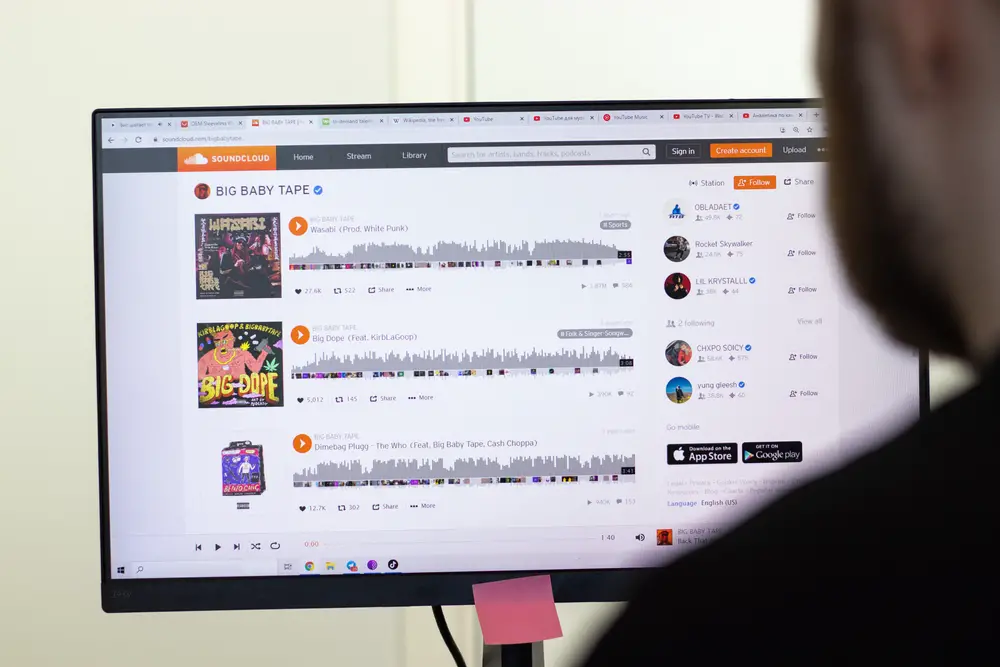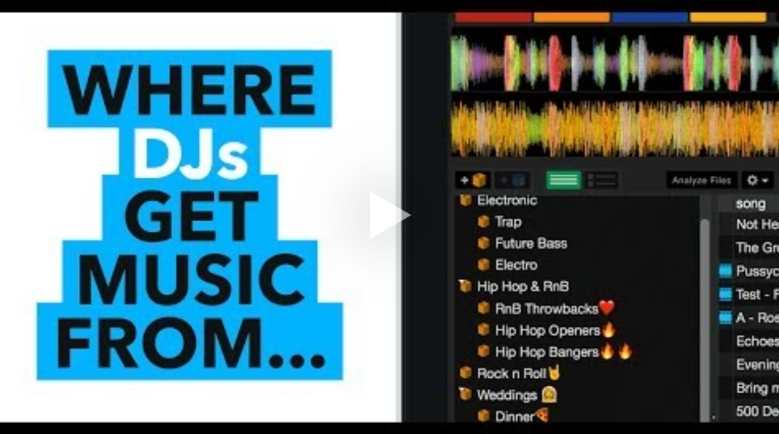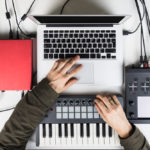Every DJ has had to deal with that annoying audience member who keeps coming up to the decks and asking for ‘a song that has words in it’ or girls on a hen night who demand you play ABBA.
Each time you have to explain ‘that’s not how it works’ and you can’t just play any song that anyone wants.
Conversely, maybe you have had a go on your friend’s decks before and you’re starting to enjoy it but you are wondering what the next step is. One of the first steps on your path as a DJ is getting a USB and creating your own song library that is unique to you.
As a DJ, your song library can be your most important tool to get people dancing, each song is a weapon in your arsenal.

As the casual listener, it can be confusing how DJs actually get their songs and where they source them from. One of the classic stereotypes of a DJ is the crate digger who finds the 1 of 5 vinyl pressing of that 10 minute long tune you heard at the last event you went to.
Even in the modern DJing scene people comment underneath the social media, Iphone quality, videos of an event asking for ‘Track IDs’ and begging ‘I’ve been looking for this track for the past five years.’
Modern digitisation of mixing software has paved the way for DJs to have their whole song library in the palm of their hand.
The traditional Vinyl DJ usually walks around with a huge box or bag of their selected tunes, but this often only a fraction of their whole vinyl collection – so which vinyl they take with them to an event can be really important.
Pre USB stick, people had to carry their CD collection with them which meant literally loading it into a disk tray on the DJ controller and finding the track manually this way.
Modern technology now allows the DJ to carry their song library in their pocket with a USB memory stick. A USB memory stick is often a fraction of the weight and size of a cd or vinyl collection, but can hold almost quadruple the amount of songs.
This means the modern DJ has thousands of songs at their fingertips.
Here’s a guide on how to explain and understand how DJs get their music and why having your own library as a DJ is important.
Why Having Your Own Unique Song Library Is Important.
If you are a DJ, you are dealing in songs. Beyond mixing proficiency your song choice is the clearest way to make a statement to an audience and differentiate yourself from other DJs.
Back when people still mixed on vinyl, they spent hours flicking through records and digging through crates in the vinyl shops, searching for those gems that no one has heard before but still gets everyone on the dancefloor can be an art in itself.
Beyond how you mix the songs, one of the most overlooked traits in a good DJ is their ability to play to any crowd, no matter what genre or time period that audience represents.
If people want to hear hard techno, you best be prepared, if people want RnB, you need to be able to satisfy that crowd too.
On the other hand, if you’re only into one genre of dance music then you can also still have depth to your song library by embracing all the sub-genres that come under your favoured scene.
More importantly, when you are using someone else’s song library you are using songs you aren’t used to or may have never heard before.
Part of becoming a better DJ is letting your own musical taste dictate your style as a DJ, as you should always focus on playing the songs you like to hear and are passionate about.
Crucially, a really important part of mixing two songs is that you know them both individually: the song’s phrasing, its key, its structure, which phrases build up, and which phrases drop the beat, etc.
At the end of the day, you want your songs to be different from the other DJs people have heard. You want to find the songs that people haven’t heard before so you aren’t just playing what other DJs already have.
It shows a certain understanding of music to be able to find songs that people haven’t heard and knowing that they will enjoy them. Understanding how an audience reacts to certain songs is the foundation of becoming a good music producer.
With the digitalisation of music in the late 1990s a whole age of digital piracy started which had its advantages and disadvantages.
One the one hand, if you don’t have the pocket to pay for your favourite music this can level the playing field somewhat, and it can be easy to just pirate your favourite songs from Youtube if you are only performing for yourself.
However, this has some obvious problems both ethically and with quality. Generally if you pirate songs in this way, the sound quality will be much lower. The benefit of paying for music is that you are being rewarded with the highest quality download of that file.
Sound quality is so important to a DJ, lower quality can affect your mixes and the balance of each track, low sound quality also means that larger, more professional, speakers will expose the tracks lack of quality.
No one wins with pirated music as your favourite DJ won’t get any money from your download and it’s important to support others within the music industry.
How To Organise Your Song Library
It might not have occurred to you how much time a DJ may spend on organising their song library, this can enable them clarity and efficiency when choosing songs on the spot.
An important factor when creating your own music library to mix with is organisation. Sitting down and organising your tracks into folders can be an arduous but extremely valuable process.
How people organise their music library is a different question. The most conventional way to organise your music is by genre, the house music in a house folder, the techno in a techno folder.
From this you can create a world of sub folders that organise this even further into the sub genres of each scene. Conversely, the multi genre DJ might opt to organise their songs by energy.
This means they can slip in and out of different genres but can still maintain a certain rhythm to their mix in general and can still control the audience even while switching genres.
Another popular organisation method is to organise by a date period.
You could create folders simply by the music you are listening to at that time, this can still enable you to differentiate between which songs are where, but means you can seamlessly float between genres and different songs with all your favourite tunes in front of you.
Where Do DJs Find Their Music?
Now that vinyl shops have been taken over by hipsters and traditionalists, rather than passionate audiophiles, most DJs download their music online.
Online there is a wealth of songs to choose from, from the independent stuff made by the bedroom DJ to the mainstream classics that you can’t leave out of your playlists.
Below I have listed some places that DJs find their music and the benefits that come with each.
Hard Copies
The most obvious place to get music is from buying a CD physically and downloading the tracks onto your USB, or buying an album online and doing the same.
If you want to buy a classic song, or a song you heard on the radio, these tracks can also be bought singularly online, directly from the record label. Traxsource is a great website to use to purchase mainstream hits and classic releases.
Soundcloud
Soundcloud is a streaming platform that often represents the underground subcultures within music.
Specifically, its electronic music community of producers and DJs have created a system where you access free downloads directly from your favoured Soundcloud producer.
The free exchange relies on affiliate download gates such as Hypeddit which require the customer to promote the artist by commenting on and re-posting the track or following their various social media accounts.
Alternatively, Soundcloud has a direct download function on its website that can be enabled by a song’s creator in the permissions settings for that track.
This means you can directly download the song through the streaming platform rather than having to go through an affiliate download gate.
Although a free direct download is being offered it can be great to support the DJ by reposting the tune or their social media pages.
The issue with Soundcloud is that the songs on offer are usually independent edits/remixes or originals from a producer, and not all songs are available for download.
If you want mainstream music or classics, then Soundcloud isn’t the place to download these tracks.
Bandcamp
Bandcamp is a streaming and sharing music platform that focuses on directly supporting artists by creating a reciprocative environment for new artists and producers.
On Bandcamp, most songs and albums are available to download for a small price.
Each artist can choose how much they want fans to pay for the track or the whole album, which sometimes involves a ‘pay what you think it’s worth’ approach where fans can download music for free if they choose to.
Bandcamps approach allows artists transparency and control over their earnings. When you buy music on Fridays at Bandcamp 100% of the profit goes directly to the artist.
Once purchased you can also choose what format you want to download the file in, which is an advantage to the website.
Not only does Bandcamp provide easy and honest ways to support your favourite artists but also serves as a vital part of the underground and independent communities in electronic music as well as other genres.
Contact The DJ Directly
It can seem obvious, but if there’s an independent DJ you like who has a song you want, you could ask the DJ directly for a copy of the track. It’s likely the DJ will have the original mp3 file of the finished song.
Through Soundcloud and Bandcamp it can be quite easy to get in direct contact with a DJ either through their social media or through the streaming platform you are using, many DJs also have business email accounts.
Oftentimes, a DJ will be glad to give you the track for free if you have shown specific enthusiasm for their work.
Original Songs
One obvious way that DJs get their music is by simply creating them themselves and owning the original master.
DJs can create their own songs, even on an independent level, through production software such as Ableton and ProTools, to name a few. Often the most famous DJs will mix and re-mix their old songs in new and different ways while performing live.
Using your own songs has its own benefit as you know the song structure and mixing of that specific song better than anyone if you made it yourself.
Some people consider this to be the pinnacle of mixing proficiency, to use your own music, and is often a goal for beginner and intermediate DJs alike.
Final Thoughts
The most obvious answer to this question is that the modern DJ finds their tracks online, on various websites which provide different ways of purchasing music, supporting the artist, and downloading files.
But the truth is that a DJ can find songs anywhere, from other DJ’s mixes, from a song they have heard on the radio, from an event they went to last week, a DJ can gain inspiration from anywhere.
It’s important to follow the natural thread of inspiration that is specific to your experiences, this thread is the specific makeup of your own music taste and is what will make your DJ mixes sound specific to you, rather than simply finding songs that no one has heard, allowing your personality to naturally come through in your work.
We hope you love the products we recommend. We may collect a commission if you purchase through one of our links. This doesn't cost you anything extra. If you do, thank you! As an Amazon Associate, I earn from qualifying purchases.







